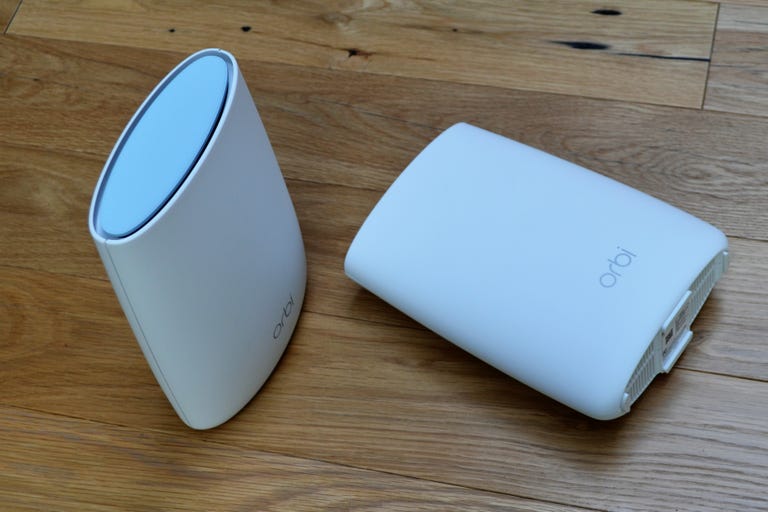 Why You Can Trust CNET
Why You Can Trust CNET Netgear Orbi Wi-Fi System review: Blanket your home with Wi-Fi the easy way
At $400 for a set of two units, the Netgear Orbi is expensive, but it might just be the best Wi-Fi system on the market.
The Orbi Wi-Fi system comes with a router (left) and an add-on satellite unit.
The Netgear Orbi is the second Wi-Fi system I've worked with and, at a glance, it seems similar to the first, the Eero.
The Good
The Bad
The Bottom Line
At the very least, the Orbi also has multiple hardware units and it's expensive as well, costing $400 for a set of two and an additional unit will cost another $250. But while both solutions can quickly blanket your home with Wi-Fi, the Orbi has the advantage of much better speed.
Dedicated extension band
With the Eero, each unit in the system is identical. Netgear went in a slightly different direction however. The Orbi includes two similar-looking devices, each with a different role. Unit one is the Orbi router. It has one WAN (to connect to the internet) and three LAN (where your computers connect to your local network) ports. This is your router of the group and functions mostly like any other, as it's able to stand on its own as your main router.
The second unit is the Orbi add-on satellite. This unit works as the wireless extender of the Orbi router and can also host up to four wired devices via its four LAN ports. It can only work with the Orbi router, and each Orbi router can handle up to three of these add-on units.
What makes the Orbi different from other Wi-Fi systems is that the add-on wireless extender connects to the main router using a dedicated Wi-Fi band.
Other Wi-Fi extenders (including the Eero) use the same bands as the routers they're extending to receive and rebroadcast Wi-Fi signals -- resulting in a 50 percent signal loss each time the signal is wirelessly extended. The Orbi system, on the other hand, uses a separate quad-stream 5Ghz band -- with a top speed of 1.7Gbps -- to connect the main router and the satellite unit. This band can't be managed by end-users and is totally separate from the other two bands the system uses to connect to wireless clients.
So what does this mean? It means that as long as you use just a single extender with the router, you won't experience any signal loss, since the router and extender are connected via their own dedicated band. The additional client bands -- 2.4Ghz and 5Ghz -- of the router are used solely to connect your devices to the network and (by extension) the internet.
In a typical home, the service line (cable, DSL etc.) almost always enters the property at a corner. That's where you'll want to place the Orbi router, then put the satellite in the middle of your home, which should net you a signal everywhere. In my trial, for a 3,000 square-foot home, the Orbi system -- one router and one add-on extender unit -- was able to cover every corner.
Setup and configuration
Setting up the Orbi system is fairly easy. First you connect the main Orbi router to an internet source like a broadband modem and turn it on. After that, place the add-on satellite unit at a distance from the main router, then turn it on and you're done. The two are preconfigured to work together, and the satellite will automatically replicate the Wi-Fi settings of the main router. The only tricky part is finding the right distance to place the add-on unit. Place it too far and there's not much signal to extend; too close, and you won't get the optimal Wi-Fi coverage, possibly missing some parts of your house.
The add-on unit has helpful, color-changing LED rings on top that indicate the quality of the signal at its location. Solid blue means a great signal, solid amber means you might want to move it a bit closer to the main router, and solid magenta means it's way too far. In my experience, it's a matter of luck to find a perfect spot to place the add-on unit, both in terms of signal and how the device physically blends in with the surroundings, but this is true of all Wi-Fi extenders.
Both the router and the add-on unit come with a Sync button on the back, in case you want to connect the add-on to a new Orbit router, or when you get an additional add-on unit for your network.
Configuring your Orbi network is like that of any Netgear router, or any router with a web interface. From a connected computer or mobile device, you can access this interface by going to orbilogin.com or use the router's default IP, which is 192.168.1.1. Now you can change the Wi-Fi network's name and password -- if you're not happy with the default one -- and manage other features of the router. The process is not as easy as that of the Eero, but if you follow the included quick setup guide, you'll get configured without much problem.
Similar to the case of the Eero, the Orbi has only one Wi-Fi network for both 2.4Ghz and 5Ghz bands, meaning you can't make a separate network for each band. However, you can do a lot more with the Orbi since it has more in-depth settings and features -- like access control, parental control, port forwarding, Dynamic DNS and so on -- similar to most recent Netgear routers. On top of that you're not required to have an account with Netgear for the router to work. (Eero requires you create an account before the router will function.)
CNET 5Ghz Wi-Fi scores
- Close range
- Long range
Performance
This is where the Orbi is decidedly better than the Eero. In my testing, with just two units, the Orbi achieved about the same range as the Eero which includes three units. Most importantly, I connected at the same speed whether connecting to the router or the extender, meaning there was no signal loss in the extension Wi-Fi network.
Note that for Wi-Fi clients, the Orbi supports the dual-stream setup of the 802.11ac Wi-Fi standard, meaning it has a top speed of 877Mbps on the 5Ghz band and 400Mbps on the 2.4Ghz band. And in testing, it delivered. While it's not the fastest Wi-Fi system on the market, it's faster than many -- and more than fast enough to deliver even the fastest internet speed.
The system also has an excellent hand-off mechanism. In my trial, I constantly moved from one end of the house to another -- forcing the device to switch from the Orbi router's original Wi-Fi network to the extended network of the add-on unit and vice versa -- while doing a speed test. Never once was I disconnected, or even experienced significantly diminished speeds compared to when I was standing still.
Should I get one?
$400 (for the router and one extender unit) is a lot of money to spend on a router. But it's still less than the Eero, which costs $100 more. That said, the Orbi is at least worth trying out if you find your current network has trouble reaching spots in your home. If the two initial units can cover your entire home (which is likely) then that convenience may just be enough to warrant the purchase. This is because a single high-end router, such as the Netgear R8500 or the Asus RT-AC5300, which cost about the same, won't be able to deliver the same Wi-Fi coverage.
However, if you think you'll need a second add-on unit to cover your entire home, the $650 cost for the router and two extender units,is way too high to justify. Especially when you consider this system works best with just a single extender and using an additional add-on unit is the point where signal loss occurs in the extended Wi-Fi network. Lastly, if your home is larger than 4,500 square feet, it might be too large for the Orbi.
If you can wait, however, the Google Wifi, which costs half the price and includes 3 units and might offer better coverage, is slated for early December. But for now, the Orbi is the best Wi-Fi system on the market.



